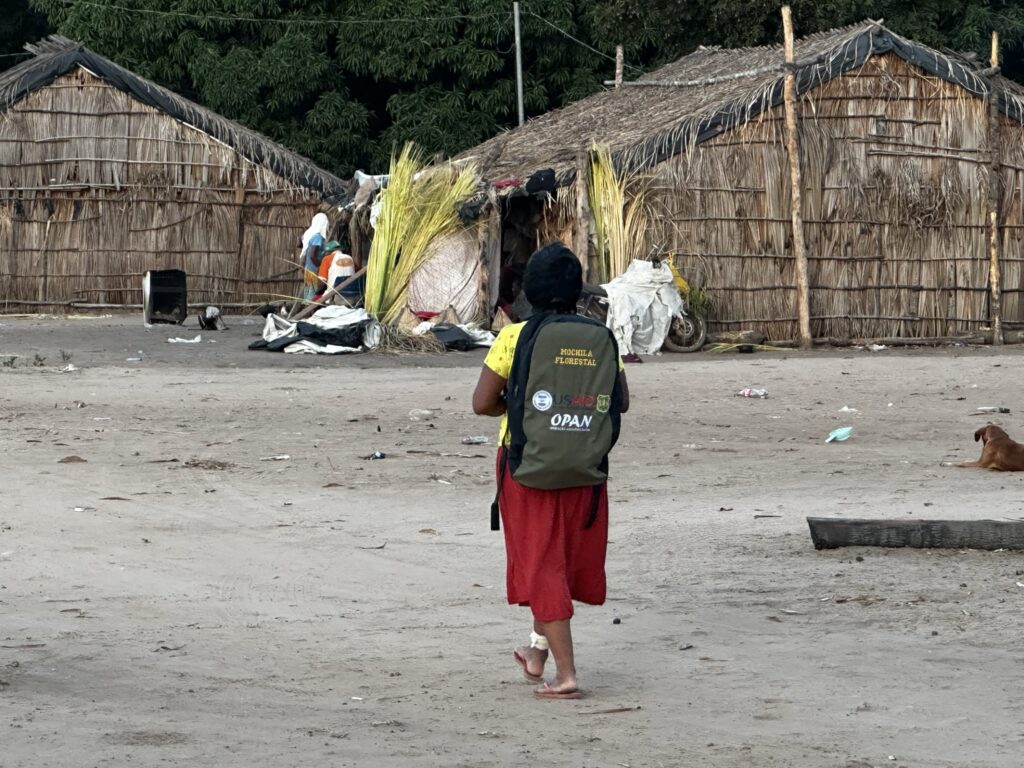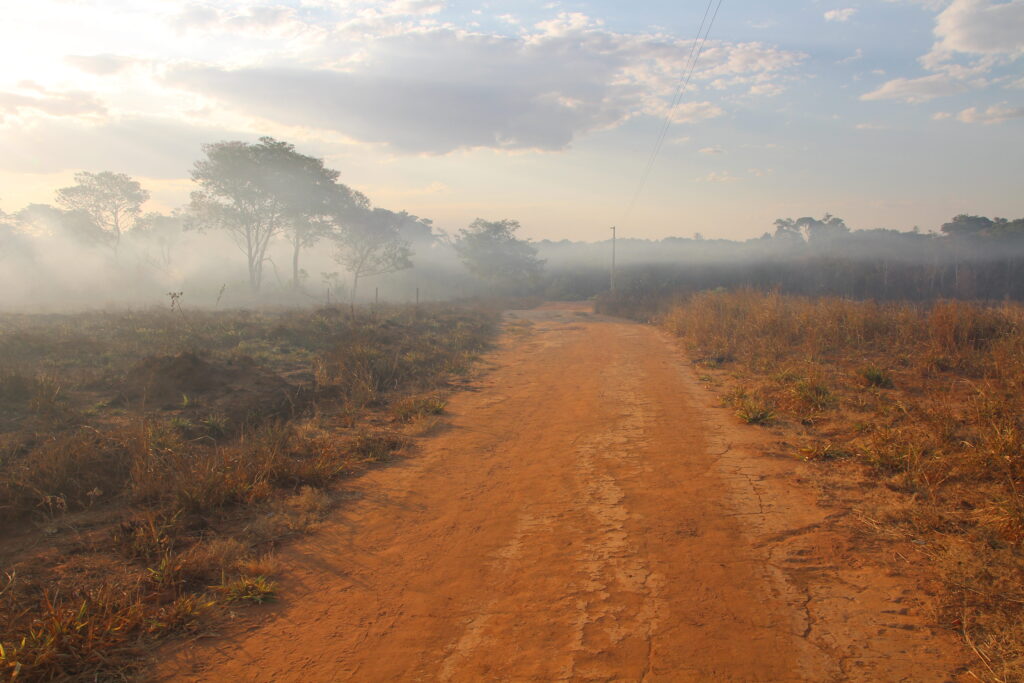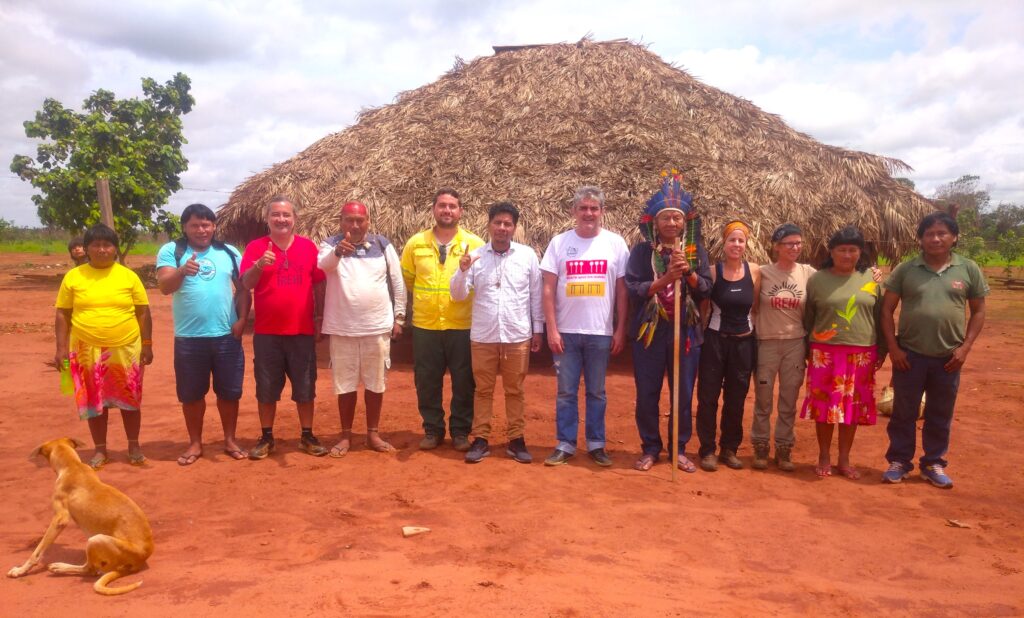Entitled Mochila Florestal Xavante – Ti Marãiwatsédé, the short film is available at Youtube Channel of Operation Native Amazon (OPAN). Directed by documentary filmmaker Laércio Miranda, the audiovisual material was carried out by OPAN with the support of the United States Agency for International Development (USAID) and the United States Forest Service (USFS).
The short film presents the entire process of building this pedagogical tool already used in communities in Peru, Ecuador, Colombia and Paraguay and which, for the first time, was elaborated from the cosmovision of an indigenous community. A backpack, a cloth fabric, dozens of fire-related figures from the Xavante cosmogony and a pedagogical booklet adapted to the local culture. These elements make up the Xavante forest backpack.
The idea is for communities to appropriate this material so that they can be established, based on the reflections raised by the activity, new protocols in dialogue with the Xavante tradition. “The idea is to provoke a community dialogue for new agreements and practices, which does not mean annulling or replacing traditional practices, but to reflect on how tradition and culture could adapt to account for the new challenges”, explains Lola Rebollar, OPAN indigenist and project coordinator.
The objective is to reduce the incidence of forest fires from the awareness and application of sustainable practices of integrated fire management, but without losing sight of its traditional use, since fire is one of the central elements of the Xavante culture. “The traditional use of fire, prevention and fighting forest fires are important knowledge. Because the use of fire for culture is good, but it is also good to know how to control it”, comments Cacica and teacher Carolina Rewaptu, one of the leaders who followed the entire process, from the agreement to the implementation of the pilot project.
The pedagogical material takes into account the Xavante’s ancestral relationship with fire. In addition to being the protagonist of the creation myth, fire is present in several everyday and ritualistic uses. “It is important that young people learn this knowledge of ancestry, that fire is important”, adds Carolina.

As it is a pilot project in Brazil, the backpack is being tested only in three of the 14 IT villages. Subsequently, the other backpacks will be distributed for implementation throughout the territory. From the experience in other Latin American communities, the expectation is positive.
“We have worked in different parts of the world to prevent and reduce the effects of forest fires and empower traditional communities to make decisions more efficient and effective. This tool brings together Xavante knowledge to support its dissemination in the fire prevention and management process”
Pedro Constantino, from the United States Forest Service (USFS).
Historical context of the Marãiwatsédé Ti

The Xavante people of Marãiwatsédé often deal with fires, after all about 70% of the native vegetation, in a transition area between the Amazon and the Cerrado, was replaced by pastures. This process took place in the period of more than 40 years in which the people were kept away from their traditional territory in favor of the interests of landowners. Withdrawn by the federal government in 1966, the Xavante only managed to return in 2004, and the disintrusion of squatters and farmers in the territory only occurred in 2013.
When they returned after the deintrusion, they found the devastated territory, transformed into pasture. And the culture of fire management is very important from a cultural point of view, as in the ritual of the Xavante hunt, where fire is used to manage the cerrado and obtain food, in addition to strengthening the traditional culture with the new generations. Finally, these practices began to require new care and agreements to prevent forest fires, because, in addition to the devastated territory, today there is still the aggravating factor of climate change and arsons committed in the dry season by people outside the IT
Lola Rebollar, OPAN indigenist
forest fire prevention backpack
Developed in 2020, the Regional Fire Program for South America emerged as a response to the increase in fires on the continent. The USFS initiative, with support from USAID, brings together partners and allies in the region. The program works with several official and private entities, universities and indigenous communities, supporting them with technical and human resources, especially in the Amazon territory.

In this context, the backpack presents itself as an innovative tool to raise awareness and base communities with regard to educational themes of integrated fire management, becoming a strategic instrument for the prevention of forest fires, which are increasing in size, frequency and intensity in recent years.
It is a tool that has greatly facilitated dialogue and environmental education in communities. The partnerships with the people who live in these communities are protagonists in fire prevention. We recognize that with the conditions of fire increasingly severe, we need to multiply efforts, always valuing the context of the place
Jayleen Vera, coordinator of the United States Forest Service Brazil Program
The Brazilian experience is the result of a partnership between the Xavante people of Marãiwatsédé, OPAN, with the support of the USFS and the United States Agency for International Development (USAID).
